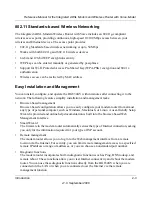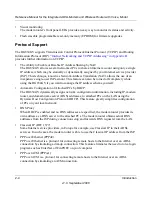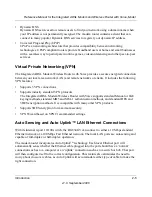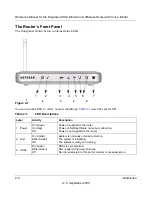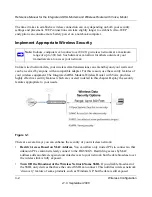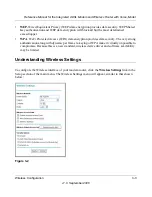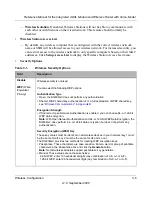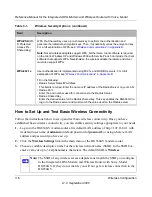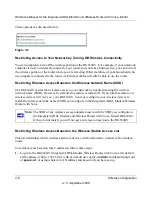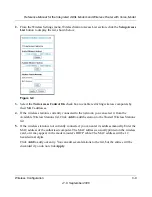
Reference Manual for the Integrated ADSL Modem and Wireless Router with Voice, Model
2-4
Introduction
v1.0, September 2006
•
Visual monitoring
The modem router’s front panel LEDs provide an easy way to monitor its status and activity.
•
Flash erasable programmable read-only memory (EPROM) for firmware upgrades.
Protocol Support
The DG834GV supports Transmission Control Protocol/Internet Protocol (TCP/IP) and Routing
Information Protocol (RIP).
“Internet Networking and TCP/IP Addressing” in Appendix B
provides further information on TCP/IP.
•
The Ability to Enable or Disable IP Address Sharing by NAT
The DG834GV allows several networked PCs to share an Internet account using only a single
IP address, which may be statically or dynamically assigned by your Internet service provider
(ISP). This technique, known as Network Address Translation (NAT), allows the use of an
inexpensive single-user ISP account. This feature can also be turned off completely while
using the DG834GV if you want to manage the IP address scheme yourself.
•
Automatic Configuration of Attached PCs by DHCP
The DG834GV dynamically assigns network configuration information, including IP, modem
router, and domain name server (DNS) addresses, to attached PCs on the LAN using the
Dynamic Host Configuration Protocol (DHCP). This feature greatly simplifies configuration
of PCs on your local network.
•
DNS Proxy
When DHCP is enabled and no DNS addresses are specified, the modem router provides its
own address as a DNS server to the attached PCs. The modem router obtains actual DNS
addresses from the ISP during connection setup and forwards DNS requests from the LAN.
•
Classical IP (RFC 1577)
Some Internet service providers, in Europe for example, use Classical IP in their ADSL
services. In such cases, the modem router is able to use the Classical IP address from the ISP.
•
PPP over Ethernet (PPPoE)
PPP over Ethernet is a protocol for connecting remote hosts to the Internet over an ADSL
connection by simulating a dial-up connection. This feature eliminates the need to run a login
program such as EnterNet or WinPOET on your computer.
•
PPP over ATM (PPPoA)
PPP over ATM is a protocol for connecting remote hosts to the Internet over an ADSL
connection by simulating an ATM connection.














